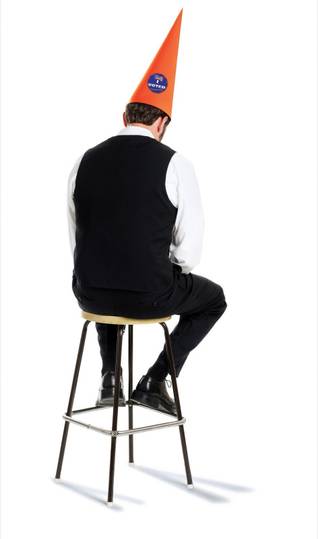
SPENCER HOLLADAY / LAS VEGAS SUN
Tuesday, Nov. 9, 2010 | 2 a.m.
Related story
Sun Coverage
At the Polls: Voter Choices
The Sun exit polled voters at three polling stations throughout the valley to find out who voters were choosing for the hotly contested Senate race between Harry Reid and Sharron Angle, the Governor race between Rory Reid and Brian Sandoval, the 3rd District Congressional race between Dina Titus and Joe Heck and the 1st District Congressional race between Shelley Berkley and Kenneth Wegner.
By now the sign on a dirt lot in the southeast valley has become an infamous symbol of Nevada’s less-than-genius politics. It read, “4 Years of Angle is better than a LIFE TIME OF REID!”
It was sponsored by the “Concerned Citizens of Nevada,” who, for all their concern, apparently did not know that a term in the U.S. Senate is six years and not four.
It wasn’t just Sharron Angle backers who showed flashes of ignorance, however. Supporters of Democrat Sen. Harry Reid were also often misinformed or uninformed.
The Sun interviewed 250 voters, and many gave baffling answers to questions about their politics, expressing a sometimes startling degree of ignorance. A man thought he had selected the challenger to Rep. Shelley Berkley even though he was in the wrong congressional district to have cast that vote. He wasn’t alone, as many voters didn’t know which district they reside in, and therefore, don’t know who their representative in Congress is.
Many in Berkley precincts mistakenly thought their choice was between Rep. Dina Titus and Joe Heck, probably because there was so much money spent on TV advertising in that race.
A voter said she chose Brian Sandoval for governor because “he’s hot.” A voter chose Reid because her husband told her to.
Voters in a North Las Vegas precinct chose all Democrats, but couldn’t articulate why they are such staunch Democrats or what they dislike about Republicans.
Voters are no better informed on specific issues, according to national surveys.
A recent Bloomberg poll showed that by a 2-to-1 margin, voters believed that under President Barack Obama federal taxes went up and that billions lent as part of the bank bailout won’t be recovered. In both cases, the opposite is true, as 95 percent of Americans got an income-tax cut, and the government is actually expected to turn a small profit on its loans to Wall Street banks.
Washington Post economics writer Steven Pearlstein cited an Associated Press poll illustrating great ignorance about the new health care reform law, with 40 percent of Americans, for instance, believing it will establish “death panels” to determine who gets care.
Political scientists say this phenomenon of the uninformed voter may be distressing, but is hardly new. As far back as the advent of scientific public opinion polling in the 1930s, Americans have shown similar levels of ignorance.
“Nobody in 2008 or 2006 or 2004 was better informed. We have a long history of this,” said Michael McDonald, a political scientist and expert on voter behavior at George Mason University.
And here’s where it’s interesting, and a little scary. “The dirty little secret of American politics is that the least-informed people are decisive in elections,” McDonald said.
This is because the most well-informed voters, the highest on the socio-economic and educational attainment ladder, tend to be partisans and not up for grabs. They know how they’re going to vote.
It’s the least-informed voters that campaigns often shoot for because they’re the most easily persuaded, especially with negative ads.
Dave Damore, a UNLV political scientist, noted that for many of these voters, politics isn’t that important. “So they get just enough information to make a decision they can live with, and if they’re wrong, they don’t care that much.”
These voters, who invest so little thought into their decision, are known in the trade as “cognitive misers.”
Damore said that although American political ignorance is nothing new, there are distressing trends that are. The slow death of newspapers could lead to even more misinformation and ignorance, he said. Then there is what’s called “narrowcasting,” or people’s proclivities for seeking out news sources that will confirm their deeply held opinions — conservatives flocking to Fox, and liberals to MSNBC.
This has the potential to increase ignorance and misinformation. Some voters, for instance, love to blame Rep. Barney Frank and Sen. Chris Dodd for the financial crisis of 2008 because the two Democrats were the chairmen of respective committees with jurisdiction over financial services. Voters heard this on talk radio and Fox. But the chronology doesn’t work. Each was in the minority until January 2007, by which time foreclosures had begun and the financial crisis was unfolding, as predicted in the years before by economists such as Nouriel Roubini.
Jon Krosnick, a Stanford University psychologist who studies voter behavior, said it’s probably pointless asking voters why they’ve made their decision. The vast majority of the time, decision-making occurs behind what he called “the black curtain of the unconscious.” People may try to explain why they make the decisions they make, but they don’t really know, and they’re just guessing.
But Krosnick said he isn’t any less concerned by what he calls “the minimal penetration of fact.”
Although he said that too often pollsters are capable of making people look foolish with misleading questions, some surveys accurately reflect the reality of an ill-informed public. “And these are consequential misunderstandings.”

Join the Discussion:
Check this out for a full explanation of our conversion to the LiveFyre commenting system and instructions on how to sign up for an account.
Full comments policy